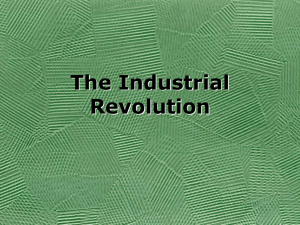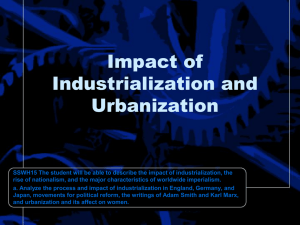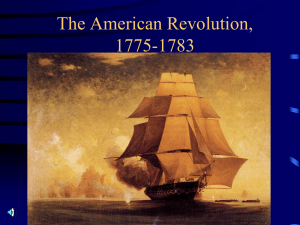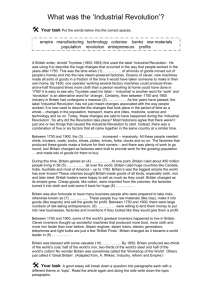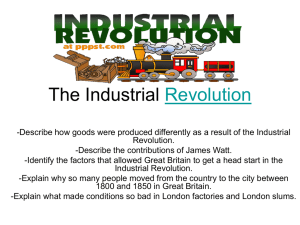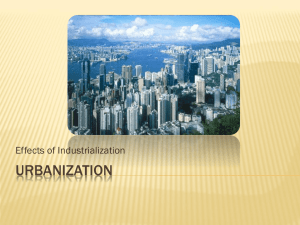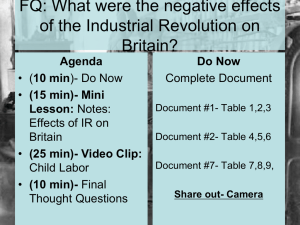UK TOPIC #4 : 19th CENTURY HISTORY
advertisement
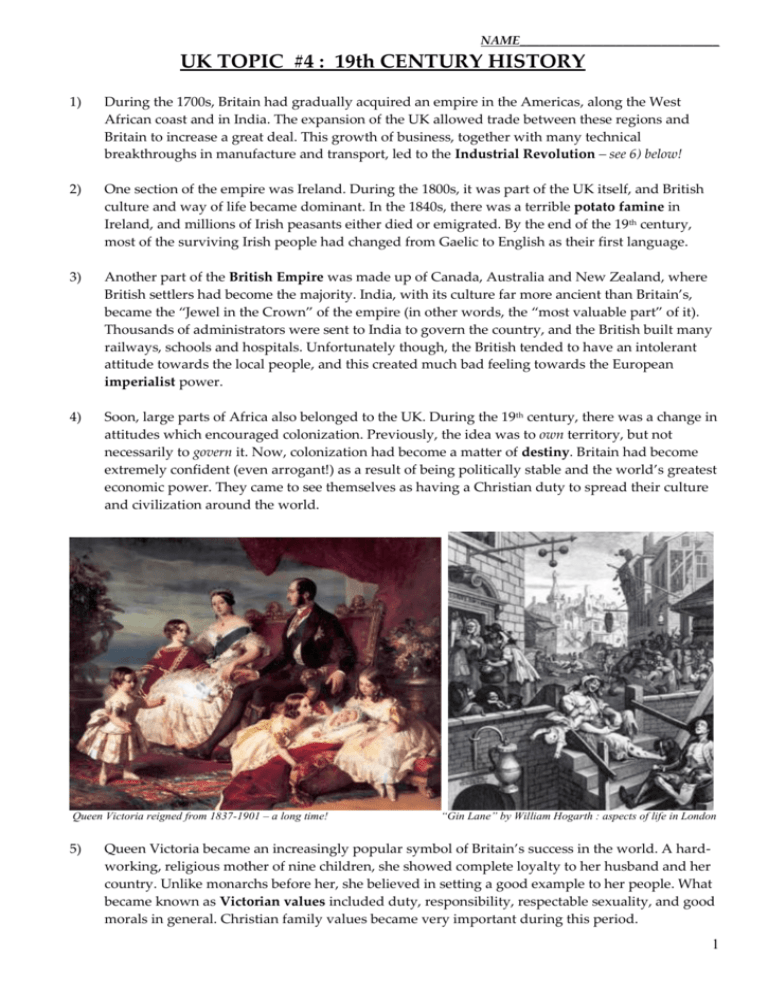
NAME_______________________________ UK TOPIC #4 : 19th CENTURY HISTORY 1) During the 1700s, Britain had gradually acquired an empire in the Americas, along the West African coast and in India. The expansion of the UK allowed trade between these regions and Britain to increase a great deal. This growth of business, together with many technical breakthroughs in manufacture and transport, led to the Industrial Revolution – see 6) below! 2) One section of the empire was Ireland. During the 1800s, it was part of the UK itself, and British culture and way of life became dominant. In the 1840s, there was a terrible potato famine in Ireland, and millions of Irish peasants either died or emigrated. By the end of the 19th century, most of the surviving Irish people had changed from Gaelic to English as their first language. 3) Another part of the British Empire was made up of Canada, Australia and New Zealand, where British settlers had become the majority. India, with its culture far more ancient than Britain’s, became the “Jewel in the Crown” of the empire (in other words, the “most valuable part” of it). Thousands of administrators were sent to India to govern the country, and the British built many railways, schools and hospitals. Unfortunately though, the British tended to have an intolerant attitude towards the local people, and this created much bad feeling towards the European imperialist power. 4) Soon, large parts of Africa also belonged to the UK. During the 19th century, there was a change in attitudes which encouraged colonization. Previously, the idea was to own territory, but not necessarily to govern it. Now, colonization had become a matter of destiny. Britain had become extremely confident (even arrogant!) as a result of being politically stable and the world’s greatest economic power. They came to see themselves as having a Christian duty to spread their culture and civilization around the world. Queen Victoria reigned from 1837-1901 – a long time! 5) “Gin Lane” by William Hogarth : aspects of life in London Queen Victoria became an increasingly popular symbol of Britain’s success in the world. A hardworking, religious mother of nine children, she showed complete loyalty to her husband and her country. Unlike monarchs before her, she believed in setting a good example to her people. What became known as Victorian values included duty, responsibility, respectable sexuality, and good morals in general. Christian family values became very important during this period. 1 6) The Industrial revolution began in Britain in the textile industry. Before the 1750s, most people worked in their cottages with their families. Travelling merchants brought the workers wool and cotton, and collected the finished cotton to sell. As the demand for cotton grew dramatically, a system of factories grew where a worker did just part of the whole job and machines were used, instead of a worker making a whole product. This was the start of the Industrial Revolution – and the start of people becoming a small link in a big chain. 19th century contrasts: Life in the industrial cities and towns… …and a quiet life in the country 7) Previously in the UK there had been two main social classes – the nobles and the peasants. These were the upper and lower class respectively. During the Industrial Revolution, a middle class developed. These people were the owners of factories, railways and mines, and some of them became as rich as the upper classes. 8) Many of the workers had moved into the cities from the country, and often lived under terrible conditions with no job security. Sometimes streets were so full of smoke that you couldn’t see the other side of the road! 9) Most working class children did not have time to go to school or to play. Instead, they worked in factories and mines along with the men and women. They were paid even less than the adults, and because their bodies were still growing, children were sometimes damaged for life by the work. 10) Another change brought by the Industrial Revolution was the growth of cities. Previously, less than 1% of people in the UK lived in cities. By 1900, the number had reached 75%. Soon, the cities became overcrowded and houses could not be built fast enough. Sometimes more than ten people lived in one room, and many people moved into damp cellars and rooms with no windows. Epidemics of cholera, typhoid and other diseases were common, and the working class had a high death rate. 11) Many people in the middle and upper classes did not care about the suffering of the workers, but some of them did believe that higher pay and better working conditions could still produce good profits. The reformers began by starting schools, orphanages, and hospitals for the poor. Improvements were slow, but gradually life became better for the working class. 12) Writers and intellectuals of this period either protested against conditions in the industrial cities (for example, Charles Dickens), or just ignored it. Many, especially the Romantic poets, wrote about the beauty of the countryside and the benefits of country life. This was something new. In 2 previous centuries, the countryside wasn’t something to be discussed or admired. But now, a thousand fine country houses were built and the countryside became something attractive. 13) As Britain’s Industrial Revolution was the world’s first, of course mistakes were made, especially as it all happened so very quickly. Other European countries learned from these mistakes, and the process of industrialization in those countries generally went more smoothly. There was less exploitation, and workers’ conditions tended to be better. Today, factories as a means of production are used all over the world, and often we do not know exactly where the product we buy comes from or who made it. Today’s global trade is a long way away from Britain’s cottage industry of 300 years ago! 14) SOME IMPORTANT EVENTS IN THE 19TH CENTURY: 1800 – The United Kingdom of Great Britain and Ireland is formed 1829 – Robert Peel creates the first modern police force. The UK police are still sometimes known as ‘bobbies’ (‘Bobby’ is a short form of the name ‘Robert’) 1833 – The first law regulating factory working conditions limits the number of hours that children are allowed to work 1833 – slavery is made illegal throughout the British Empire 1868 – The TUC, the first trade union organisation, is formed 1886 – the first time an atheist is allowed to sit in Parliament 1893 – the first socialist, Keir Hardie, is elected to Parliament. He enters Parliament for the first time wearing a cloth cap (which remained a symbol of working men for many years) QUESTIONS ON UK TOPIC #4 Answer the following in your own words: 1. Before the Industrial Revolution, where did most British people work?_________________________________ 2. What is meant by "the textile industry"? ________________________________________________________ 3. Which was the new social class that developed during the Industrial Revolution?________________________ 4. Where did many lower class people move to in order to find work?___________________________________ 5. What did most working class children do during the daytime? ___________________________________________________________________________________________ 6. Many workers lived in poor, overcrowded conditions in British cities and towns. Why was this? (2 reasons 2 marks) _______________________________________________________________________________________________ _________________________________________________________________________________________________ __________________________________________________________________________________________________ 7. Why was the process of industrialization less "painful" in other European countries? _________________________________________________________________________________________________ _________________________________________________________________________________________________ Adapted from O’Driscoll, Britain, and English Speaking World by Julian Goddard 3



